Does Aloe Vera Repel Mosquitoes? The Science & More
Ah, summer!
The season of barbecues, beach trips, and… Huh? mosquitoes?
These annoying little (and no so little at times!) creatures not only leave itchy bites but can also transmit diseases.
Perhaps you’ve heard that Aloe vera, the plant renowned for its soothing and medicinal properties, could be a natural “shield” against these unwanted insects.
Let’s find out together if aloe vera holds the key to enjoying those summer moments without the buzz and bites.
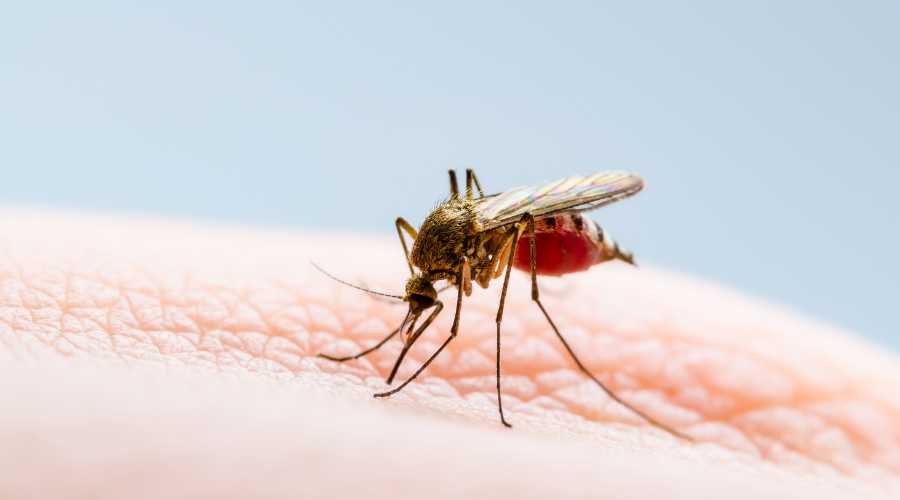
As a certified skincare formulator, I’m always amazed by nature’s untapped wonders. I wish we’d see more products that blend traditional wisdom with modern science, NOT JUST in skincare but for overall well-being.
The Magic in Aloe Vera
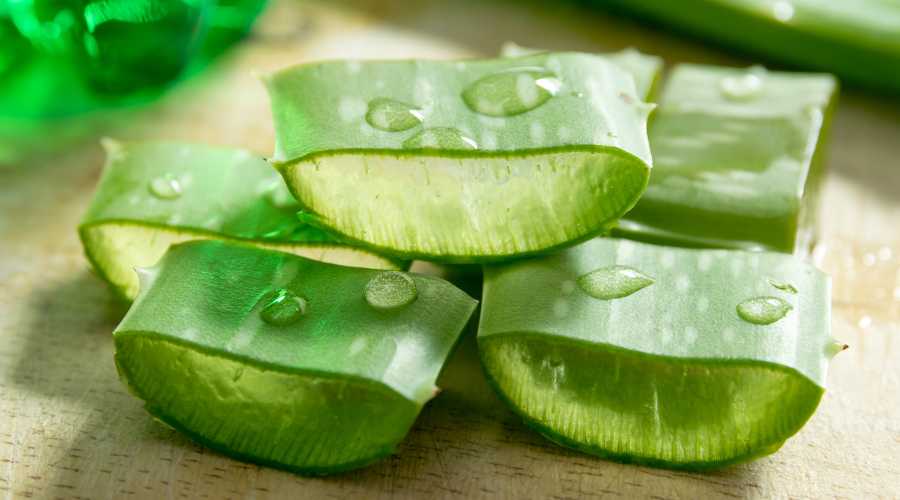
When you think of Aloe vera, you might picture a green, spiky plant sitting on a windowsill, basking in the sun.
But there’s so much more to this plant than meets the eye, believe me.
I use it for so many things I can’t even start to list them all without turning this article into an Aloe vera encyclopedia!
From giving my skin that natural glow to taming my wild hair on humid days, and even as a quick remedy for those unexpected kitchen burns – Aloe vera has been my go-to solution for (almost) everything.
It’s like having a little green first-aid kit right in my garden.
The Aloe vera plant is a member of the succulent family, has been around for ages and is native to the Arabian Peninsula, for those who are interested in knowing.
The plant’s thick leaves are filled with a clear gel (the famous “Aloe vera gel”), where the magic takes place.
This gel comprises around 96% water, but I can assure you the remaining 4% packs a punch.
It not only contains vitamins, enzymes, amino acids, and minerals that play a crucial role in its therapeutic properties, but it also boasts antioxidants and anti-inflammatory compounds that make it a holistic remedy for a myriad of skin, health, and digestive concerns.
But what about mosquitoes?
How Does Aloe Vera Repel Mosquitoes?

The below compounds, each with its unique properties, contribute to Aloe vera’s potential as a mosquito repellent.
But it’s also worth considering how they might work in tandem, enhancing each other’s effects for a more potent repellent action.
1. The “Yellow Sap” or “Latex”: Aloin
(Aloin is the yellow liquid in Aloe vera, I took some photos, take a look)
- Chemical Structure and Properties: Aloin is a complex anthraquinone, giving it a distinct yellow colour. It’s primarily found in the latex layer just beneath the skin of the Aloe vera leaf. It is bitter, very bitter! No wonder mosquitoes must hate it.
- Role in Repelling Mosquitoes: The bitterness of aloin is its defining characteristic and acts as a deterrent for mosquitoes. It is believed that aloin’s strong taste and odour can mask the natural scents that attract mosquitoes, making it harder for them to locate their target (you!).
2. Polysaccharides in the Gel
- What Are They?: Polysaccharides are long chains of carbohydrate molecules, and in Aloe vera, they’re responsible for the gel-like consistency of the inner leaf pulp.
- Role in Repelling Mosquitoes: Beyond their well-documented skin-soothing properties, polysaccharides might create a protective barrier on the skin. This barrier could potentially make it harder for mosquitoes to detect the lactic acid and carbon dioxide we emit, two of their primary attractants.
3. The Soapy Sapponins
- Nature’s Soap: Saponins are so named because of their soap-like properties. They can create a frothy mixture when shaken with water, much like soap.
- Role in Repelling Mosquitoes: The presence of saponins on the skin might interfere with the sensory mechanisms of mosquitoes. Their soap-like nature could potentially disrupt the mosquito’s ability to ‘taste’ or ‘smell’ the skin, making it less appealing for a bite.
The Synergistic Effect
While each compound in Aloe vera has its unique properties, it’s essential to consider how they might work together. Nature often works in harmony, and the combined effect of these compounds could be more potent than each acting alone.
- Aloin & Polysaccharides: The bitterness of aloin might deter mosquitoes, but when combined with the protective barrier created by polysaccharides, it could enhance the repellent effect. Imagine a scenario where the mosquito is not only deterred by the scent but also finds it challenging to land or bite due to the barrier.
- Saponins & Aloin: The soap-like nature of saponins could potentially spread the bitter aloin more evenly on the skin, ensuring a more consistent repellent effect. This combination might make the skin’s surface less appealing to mosquitoes both in scent and taste.
- Polysaccharides & Saponins: The gel-like nature of polysaccharides combined with the frothy properties of saponins might create a unique texture on the skin. This texture could further deter mosquitoes by creating an unfamiliar surface, making it less inviting for a bite.
In essence, while each compound has its role, their combined effect could be the key to Aloe vera’s potential as a natural mosquito repellent.
It’s a testament to nature’s wisdom, where different elements come together to create a solution that’s greater than the sum of its parts.
This synergy underscores the beauty of natural remedies. Instead of isolating compounds, as is often done in synthetic products, nature offers a holistic solution where multiple elements work in harmony.
Decoding Mosquitoes: How Aloe Vera Outsmarts Their Sensory Tricks!
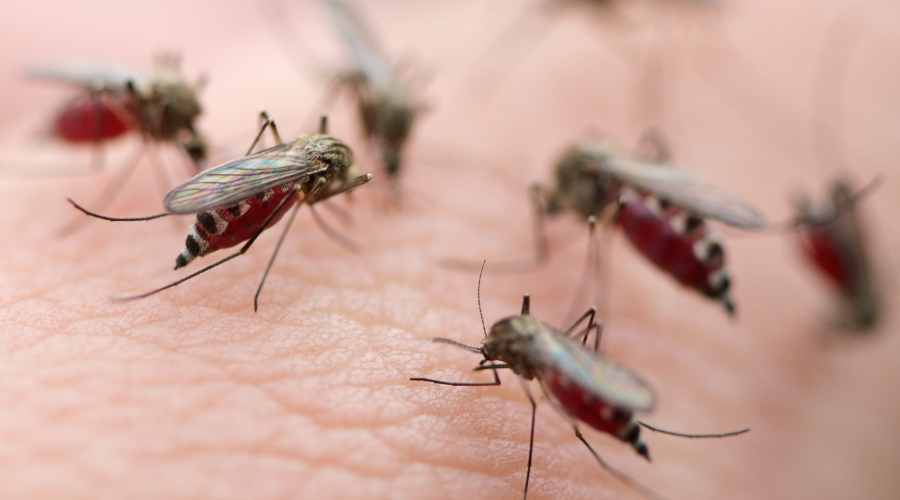
Mosquitoes, despite their small size, have evolved with sophisticated sensory mechanisms that help them locate their next meal (again: you).
To understand how Aloe vera might deter these pests, it’s important to first grunderstand how mosquitoes sense their environment.
- Antennae and Carbon Dioxide: Mosquitoes have highly sensitive antennae that can detect carbon dioxide (CO2) released when we breathe. This CO2 acts as a beacon, guiding them towards potential hosts. Aloe vera’s compounds, especially aloin with its strong scent, might mask or interfere with this CO2 detection, making it harder for mosquitoes to locate us.
- Lactic Acid and Skin Scents: Our skin releases various compounds, including lactic acid, which mosquitoes find particularly attractive. The presence of saponins and polysaccharides in Aloe vera might alter the skin’s natural scent profile, making it less appealing to these pests.
- Heat and Moisture: Mosquitoes are also attracted to heat and moisture. While Aloe vera doesn’t directly alter body heat, the cooling effect of its gel might make the skin’s surface less detectable in terms of warmth.
- Interference with Sensory Mechanisms: The combined effect of Aloe vera’s compounds could potentially disrupt the sensory mechanisms of mosquitoes. For instance, the soap-like saponins might create a film on the skin that interferes with the mosquito’s ability to detect lactic acid or other attractants.
So; while mosquitoes have evolved with advanced sensory tools to locate us, nature provides us with remedies like Aloe vera that might JUST outsmart these pests!
By potentially interfering with their sensory mechanisms, Aloe vera offers a natural shield, making our skin a less inviting target for a mosquito’s next bite.
Scientific Studies Backing Up How Aloe Vera Repels Mosquitoes
What does science have to say about the topic?
Research has shown that pure Aloe vera has higher concentrations of the beneficial compounds that can deter mosquitoes.
Other studies have looked into the repellent properties of Aloe vera. For instance, a research paper found that Aloe vera extracts, when tested among other natural ingredients, showed significant repellent activity against mosquitoes.
Another study, while focusing on Aloe vera’s antibacterial and hydrophobic properties, provides insights into its potential applications in repelling pests.
These findings suggest that Aloe vera could be a safer alternative to chemical repellents.
While Aloe vera might not be the first thing that comes to mind when you think of mosquito repellents, its potential should not be underestimated.
How to Use Aloe Vera to Repel Mosquitoes
1. You Need to Choose the Right Aloe Vera Product
While many Aloe vera products are on the market, not all are created equal.
It’s best to opt for pure Aloe vera gel for mosquito protection. This ensures you get the plant’s natural benefits without unwanted additives.
Moreover, when you extract the gel directly from the leaf, it’s almost inevitable that some aloin will be present, as completely draining is quite challenging. I have tried many times and never succeeded 100%.
Also, some commercial products might contain preservatives or fragrances that dilute their effectiveness.
Always check the ingredients list and, when possible, go organic.
If you don’t have the plant at home, I suggest this organic Aloe vera gel because it’s cold-pressed from the leaf, rather than from powder or juice that has been thickened:
2. How to Apply the Gel
Before applying, ensure your skin is clean and dry. This helps the Aloe vera adhere better and last longer.
If you have an Aloe vera plant, you can extract the gel by slicing a leaf open.
When scooping out the clear gel inside, you might inadvertently collect some of the yellow aloin from just beneath the leaf’s skin.
If you wish to minimise the aloin content, you can let the leaf stand upright in a container for 20-30 mins, allowing the aloin to drain out before extracting the gel.
This process ensures you get a purer gel, though retaining some aloin might be beneficial for repelling mosquitoes*.
Spread the gel evenly on exposed skin areas, paying special attention to the ankles, wrists, and neck, where mosquitoes are particularly fond of biting.
Here are the steps:
- Prepare Your Skin: Start with clean and dry skin to ensure the Aloe vera adheres well and provides lasting protection.
- Harvest the Gel: If you have an Aloe vera plant at home, select a mature leaf and slice it open to access the gel inside.
- Consider the Aloin: When extracting the gel, be aware that you might collect some yellow aloin. This compound found just beneath the leaf’s skin, may enhance the mosquito-repelling properties*.
- Optional Aloin Drainage: If you’d rather have a purer gel, stand the sliced leaf upright in a container for about 20-30 minutes. This allows most of the aloin to drain out.
- Application: Using your fingers, spread the Aloe vera gel evenly on all exposed skin areas. Pay special attention to the ankles, wrists, and neck, as mosquitoes tend to target these areas more frequently.
- Reapplication: Depending on your activity level and exposure, consider reapplying every few hours for continuous protection.
*Note: While Aloe vera is known for its skin-soothing properties, the exact efficacy of aloin as a mosquito repellent is still being researched. Always conduct a patch test when trying a new remedy on your skin.
Before applying Aloe vera gel extensively, conducting a patch test is advisable. Apply a small amount of the gel to a discreet area of your skin and wait for 24 hours. If no irritation or allergic reaction occurs, it should be safe to use on larger areas. Remember, everyone’s skin is different, and what works for one person might not work for another.
3. Another option: Aloe Vera and Olive Oil
Another natural remedy to consider for mosquito protection is a mixture of Aloe vera gel and olive oil.
A study conducted by researchers from the Kohat University of Science and Technology in Pakistan found that this combination repels mosquitoes and moisturises the skin.
(Fresh Aloe vera gel was mixed with olive oil and applied to the skin. The participants who used this mixture reported fewer mosquito bites, with some concentrations even providing complete protection!).
Creating and Applying the Aloe Vera and Olive Oil Blend
Ingredients:
- Fresh Aloe vera gel
- Olive oil
Instructions:
- Combine equal parts of Aloe vera gel and olive oil in a clean bowl. For example, if you’re using a tablespoon of Aloe vera gel, add a tablespoon of olive oil. Mix thoroughly until you get a smooth, consistent blend.
- Before applying, make sure your skin is clean and dry. Using your fingers, gently massage the mixture onto exposed areas of your skin, such as your arms, legs, and neck. Pay special attention to areas where mosquitoes tend to bite more, like your ankles and wrists.
- If you’ve made more than you need for one application, you can store the remaining mixture in a clean, airtight container. Keep it in a cool, dark place or in the refrigerator. Use within five days for the best results.
This blend helps repel mosquitoes and moisturises and nourishes your skin, thanks to the hydrating properties of Aloe vera and the enriching benefits of olive oil. It’s a win-win for both protection and skincare!
3. When to Apply Aloe Vera for Mosquitoes
The early evening and dawn are prime mosquito times, so applying Aloe vera gel during these periods is wise.
If you’re planning to be outdoors for an extended time, consider reapplying every couple of hours to maintain its effectiveness.
4. How Long Does it Last, and How Effective is It?
Aloe vera’s repellent properties can last for a few hours, but factors like sweating, swimming, or rain might reduce its duration.
If you notice mosquitoes starting to retake an interest, it’s time for a top-up.
5. What Else is Aloe Doing to My Body?
Beyond its potential repellent properties, Aloe vera is a treat for the skin. It moisturises, soothes, and can even help with sunburn.
It is gentler on the skin and the environment than chemical repellents.
Moreover, as we’ve explored earlier, there’s growing interest in the potential of Aloe vera as an alternative to traditional repellents
So, next time you’re gearing up for a day in nature, consider reaching for that Aloe vera gel.
Aloe Vera Is Very Soothing For Insect Bites in General
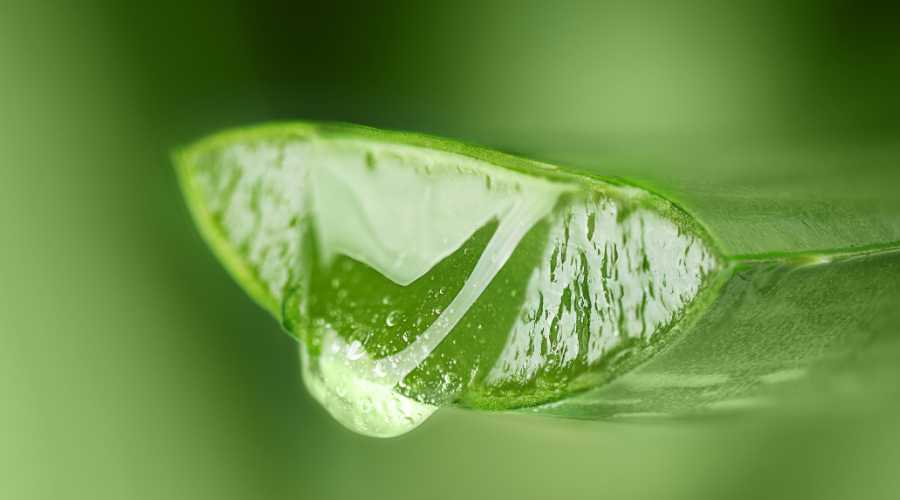
Aloe vera provides immediate relief when applied to mosquito bites by reducing itching, swelling, and redness.
The gel forms a protective layer on the skin, which moisturises and accelerates the healing process.
This is largely due to the presence of compounds like glycoproteins, which reduce pain and inflammation, and polysaccharides, which promote skin repair and growth.
For optimal relief from insect bites:
- Clean the Affected Area: Ensure the bite area is clean before applying any remedy. Gently wash with soap and water to remove any contaminants.
- Apply Aloe Vera Gel: Using your fingers, apply a generous amount of fresh Aloe vera gel directly to the bite. If you’re using store-bought gel, ensure it’s pure and free from added chemicals or fragrances.
- Reapply as Needed: Depending on the severity of the bite, you might need to reapply the gel every few hours for continuous relief.
- Store the Gel Properly: If you’re extracting gel from a fresh Aloe vera leaf, store the remaining gel in a cool place or refrigerator. This preserves the gel and provides a cooling effect upon application.
Incorporating Aloe vera into your post-bite care can make a significant difference in comfort levels, as you can see.
So, the next time you’re faced with the aftermath of a mosquito’s love affair, reach out for that green succulent sitting on your windowsill!
Other Benefits of Using Aloe Vera as a Repellent
Building on Aloe vera’s soothing properties for insect bites, it’s worth noting that this wonder plant offers more than just immediate relief.
When used as a repellent, Aloe vera brings a host of additional benefits to the skin. Rich in vitamins, enzymes, and antioxidants, Aloe vera repels mosquitoes and nourishes and hydrates the skin. Its anti-inflammatory properties can reduce redness and swelling, making it an excellent choice for sensitive skin types.
There’s a stark contrast in comparing Aloe vera to traditional chemical mosquito repellents! Many commercial repellents contain DEET, a powerful chemical effective against mosquitoes but known to cause skin irritations in some individuals.
Over time, frequent use of such chemicals can strip the skin of its natural oils, leading to dryness and sensitivity. On the other hand, Aloe vera maintains the skin’s moisture balance while protecting against mosquitoes.
In essence, opting for Aloe vera as a repellent means you’re choosing a solution that not only keeps mosquitoes at bay but also cares for your skin, ensuring it remains soft, hydrated, and healthy!
Mosquitoes and Their Behaviour
While small, mosquitoes play a significant role in our ecosystem and health. These tiny insects breed in stagnant water, with their larvae thriving in everything from ponds to discarded containers. As they mature, they seek out blood meals, which is where humans often come into the picture.
It’s not just the itchiness of their bites that’s concerning. Mosquitoes are vectors for various diseases, including malaria, dengue, and Zika virus. These diseases can have severe implications for human health, making mosquito control vital.
Interestingly, mosquitoes are selective in their targets. They’re drawn to carbon dioxide, body heat, and certain scents, explaining why some people seem to get bitten more than others. Understanding their behaviour and preferences can be key to effective prevention and protection.
Other Natural Methods to Repel Mosquitoes
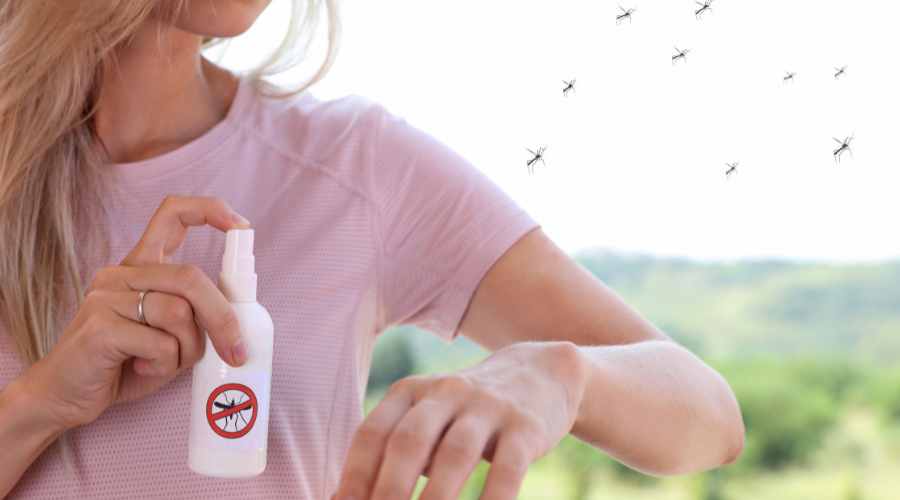
While Aloe vera is a notable contender, nature has more to offer in the realm of repellents.
Lemon Eucalyptus Oil
Recognised by health authorities, this oil stands out as an effective mosquito repellent.
Citronella
Commonly found in candles and sprays, citronella can deter mosquitoes, though its efficacy can vary. I personally have not found it to be so effective in the past.
Other Plant-based Repellents
Lavender, peppermint, and tea tree oil are popular choices, each with a unique scent and protective properties. Mixing Aloe vera gel with one of these essential oils will enhance its repellent properties.
My Aloe Vera-Based Repellent Recipes
Having spent years as a skincare formulator, I’ve always been fascinated by the power of natural ingredients. That is, in fact, the very reason why I created Oh Mighty Health.
Aloe vera, with its many, many benefits, has been a staple in many of my formulations from day one.
Let’s combine the power of Aloe vera and these ingredients to repel mosquitoes!
1. Aloe & Lavender Mosquito Repellent
Ingredients:
- Fresh Aloe vera gel: 100 ml
- Lavender essential oil: 10 drops
Method:
- Extract the Aloe vera gel from a fresh leaf, as explained above, or buy the gel.
- Mix in the lavender essential oil until well combined.
- Store in a glass container and apply generously on exposed skin. Always shake before using to combine the ingredients well.
My Thoughts: The calming scent of lavender not only helps repel mosquitoes but also provides a relaxing aroma. The Aloe vera ensures the skin remains moisturised.
2. Aloe, Peppermint & Lemon Eucalyptus Spray
Ingredients:
- Fresh Aloe vera gel: 50 ml
- Distilled water: 50 ml
- Peppermint essential oil: 5 drops
- Lemon eucalyptus essential oil: 5 drops
Method:
- Combine the Aloe vera gel and distilled water in a spray bottle.
- Add the essential oils and shake well.
- Spray on exposed skin before heading outdoors. Always shake before using as the essential oils must be combined with the gel and water each time.
My Thoughts: This spray feels refreshing, especially on a hot day. The combination of peppermint and lemon eucalyptus offers a potent repellent effect!
3. Aloe & Tea Tree Lotion
Ingredients:
- Fresh Aloe vera gel: 90 ml
- Coconut oil (melted): 10 ml
- Tea tree essential oil: 10 drops
Method:
- Mix the Aloe vera gel and melted coconut oil in a bowl.
- Add the tea tree essential oil and blend well.
- Store in a glass jar and apply as needed. Always mix again before applying.
My Thoughts: Tea tree’s antiseptic properties combined with Aloe vera’s soothing effect make this lotion perfect for post-bite application. It not only repels mosquitoes but also aids in healing any existing bites.
Aloe Vera and Mosquitos: The History
Ancient Egypt:
- Aloe vera was known as the “plant of immortality” in ancient Egypt. It was used for various purposes, including skin care and treating infections and parasites.
- Cleopatra and Nefertiti were said to have used Aloe vera as part of their beauty regimens, which might have included its use to soothe insect bites given the Nile’s mosquito population.
Ancient Greece and Rome:
- Greek and Roman texts mention using Aloe vera for treating wounds, calming inflammation, and other medicinal purposes.
- While not explicitly mentioned as a repellent, its soothing properties would have been beneficial for insect bites and stings.
India:
- Aloe vera has been used in Ayurvedic medicine for over a thousand years. It’s known as “Ghritkumari” in Sanskrit.
- It’s used to treat skin diseases and infections and as a natural moisturiser and healer. Its cooling properties would have been applied to insect bites to reduce itching and inflammation.
China and Japan:
- In traditional Chinese medicine, Aloe vera is used to treat fungal diseases. Its cooling and healing properties would have been beneficial for insect bites.
Native Americans:
- Native American tribes considered Aloe vera a “wand of heaven” or “magic wand” due to its diverse healing properties.
- They used it to treat skin conditions, wounds, and insect bites.
Africa:
- Given the hot climate and prevalence of insects, Aloe vera was used in various African cultures to soothe the skin, especially after insect bites or stings.
Modern Times:
- Today, many cultures continue to use Aloe vera gel directly from the plant to soothe mosquito and other insect bites due to its anti-inflammatory and cooling properties.
While historical texts might not explicitly state Aloe vera’s use as a repellent, its widespread use to treat skin conditions, including insect bites, is evident.
Is Aloe Vera the Natural Repellent We’ve Been Searching For?
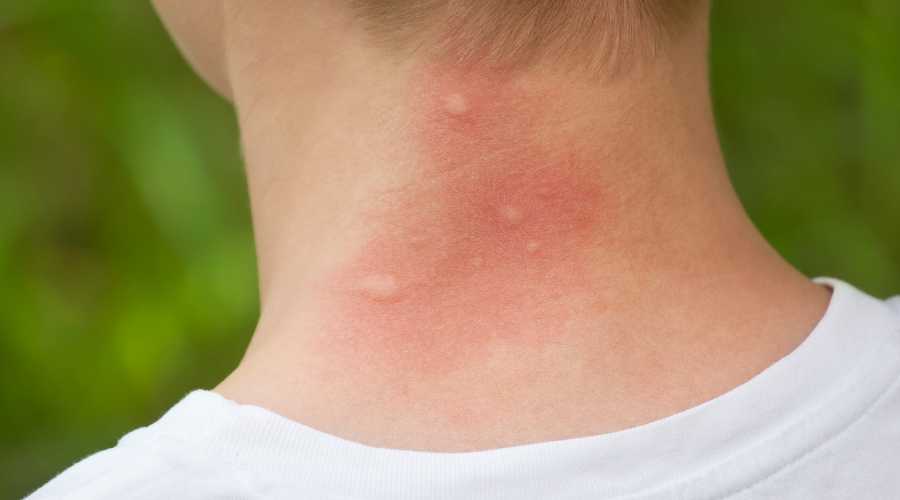
We’ve discovered Aloe vera’s magic in the realm of natural repellents.
Not only does it potentially keep those irritating mosquitoes at bay, but it also soothes their annoying bites. Win-win!
Both science and personal stories hint that Aloe vera might be the trusty sidekick we’ve been looking for in our battle against these little critters.
Why not give Aloe vera a shot?
It’s not just about repelling mosquitoes; it’s about pampering your skin and making eco-friendly choices.
I use it daily, and the transformation in my hair and skin has been remarkable. Words can’t capture the full extent of its benefits!
If you’re someone who’s cautious about what goes on your skin or just keen on ditching chemicals, Aloe vera is a fantastic pick.
But it’s not just about Aloe vera. Our quest for natural repellents is part of a bigger picture: a move towards greener, healthier choices.
In today’s world, leaning on nature for answers isn’t just a passing phase; it’s essential.
So, by choosing natural alternatives like Aloe vera, we’re not only looking after ourselves but also giving a little love back to our planet. 🌍💚
Thank you.

